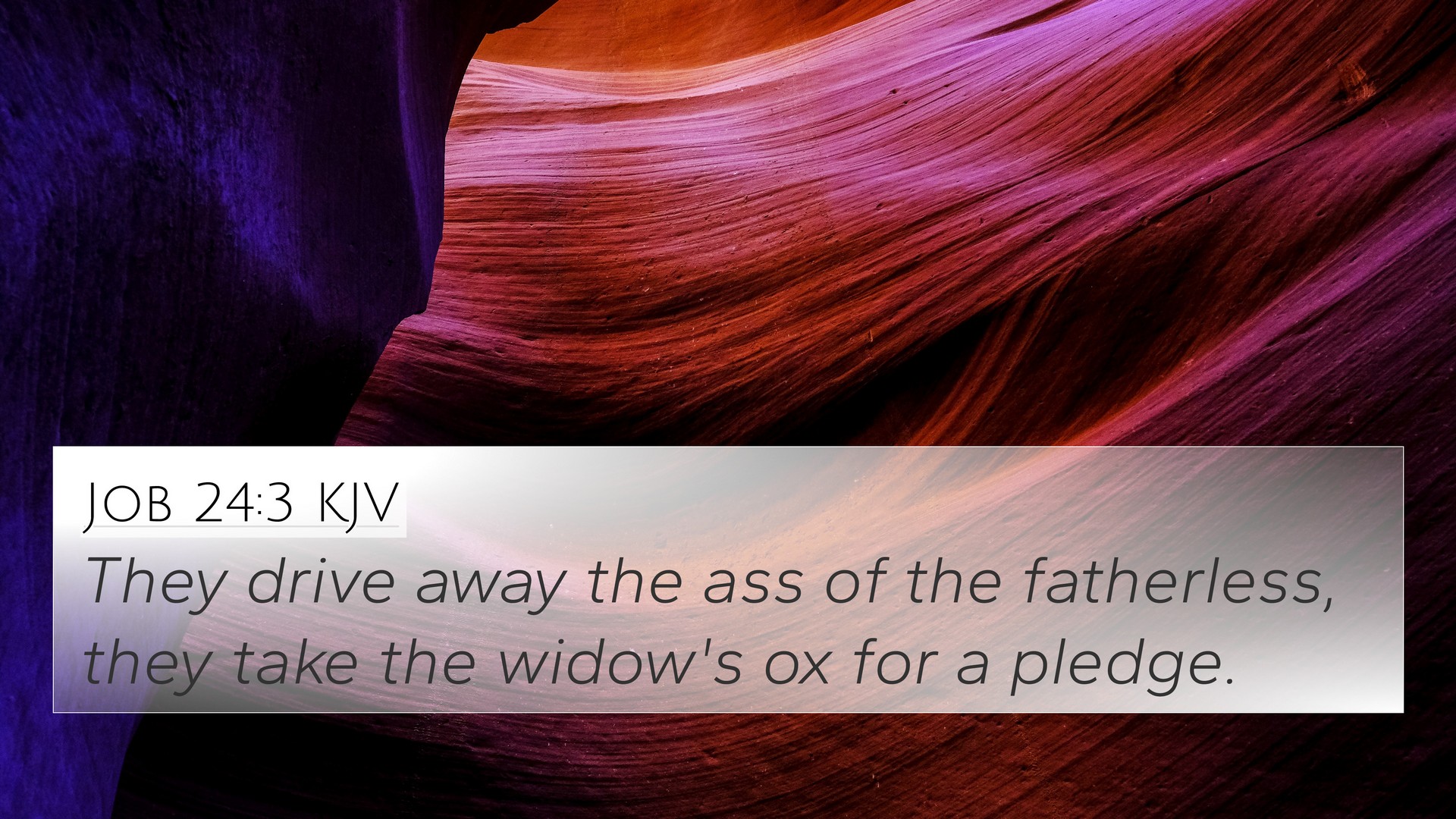Old Testament
Genesis Exodus Leviticus Numbers Deuteronomy Joshua Judges Ruth 1 Samuel 2 Samuel 1 Kings 2 Kings 1 Chronicles 2 Chronicles Ezra Nehemiah Esther Job Psalms Proverbs Ecclesiastes Song of Solomon Isaiah Jeremiah Lamentations Ezekiel Daniel Hosea Joel Amos Obadiah Jonah Micah Nahum Habakkuk Zephaniah Haggai Zechariah MalachiJob 24:3 Similar Verses
Job 24:3 Cross References
They drive away the ass of the fatherless, they take the widow's ox for a pledge.
Uncover the Rich Themes and Topics of This Bible Verse
Listed below are the Bible themes associated with Job 24:3. We invite you to explore each theme to gain deeper insights into the Scriptures.
Job 24:3 Cross Reference Verses
This section features a detailed cross-reference designed to enrich your understanding of the Scriptures. Below, you will find carefully selected verses that echo the themes and teachings related to Job 24:3 KJV. Click on any image to explore detailed analyses of related Bible verses and uncover deeper theological insights.
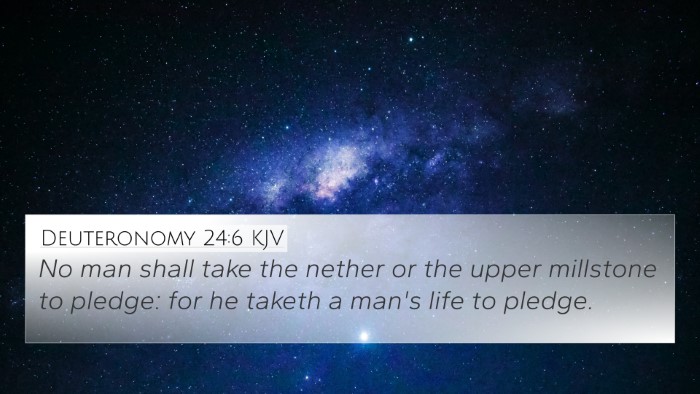
Deuteronomy 24:6 (KJV) »
No man shall take the nether or the upper millstone to pledge: for he taketh a man's life to pledge.
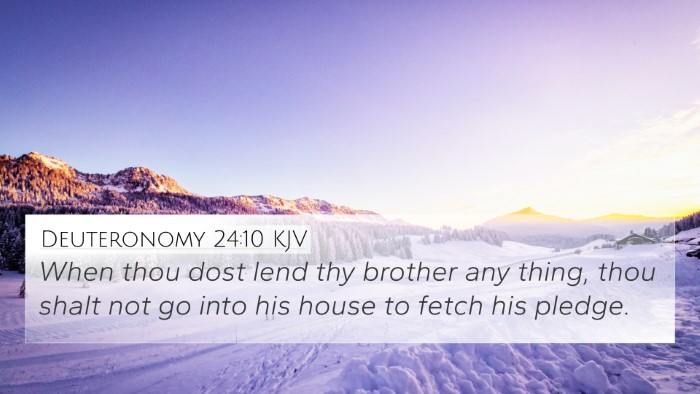
Deuteronomy 24:10 (KJV) »
When thou dost lend thy brother any thing, thou shalt not go into his house to fetch his pledge.
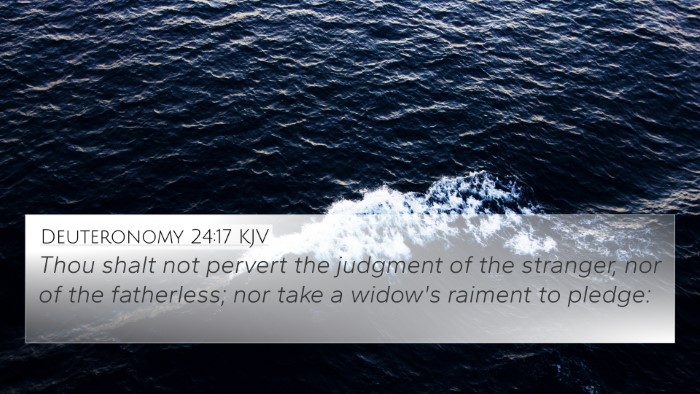
Deuteronomy 24:17 (KJV) »
Thou shalt not pervert the judgment of the stranger, nor of the fatherless; nor take a widow's raiment to pledge:
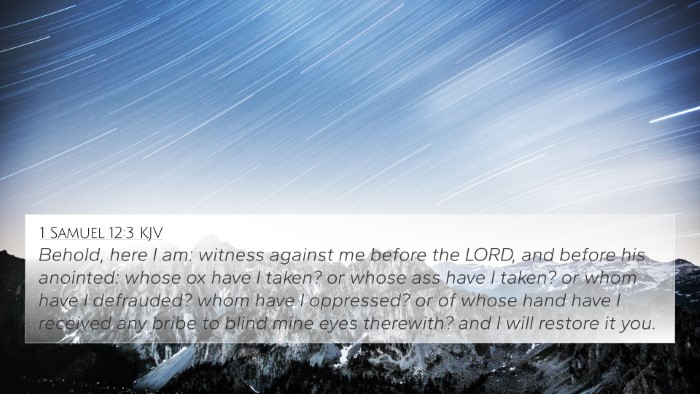
1 Samuel 12:3 (KJV) »
Behold, here I am: witness against me before the LORD, and before his anointed: whose ox have I taken? or whose ass have I taken? or whom have I defrauded? whom have I oppressed? or of whose hand have I received any bribe to blind mine eyes therewith? and I will restore it you.
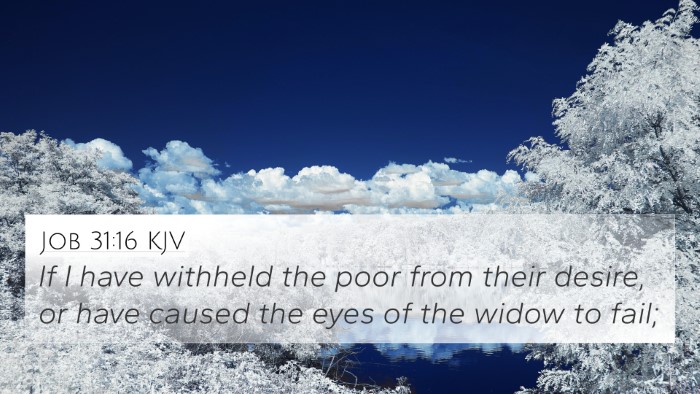
Job 31:16 (KJV) »
If I have withheld the poor from their desire, or have caused the eyes of the widow to fail;
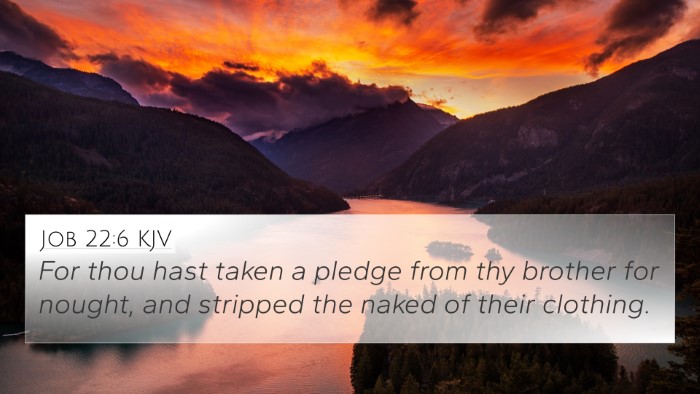
Job 22:6 (KJV) »
For thou hast taken a pledge from thy brother for nought, and stripped the naked of their clothing.
Job 24:3 Verse Analysis and Similar Verses
Understanding Job 24:3
Job 24:3 states, "They drive away the ass of the fatherless; they take the widow's ox for a pledge." This verse highlights the injustices faced by vulnerable members of society—namely, orphans and widows—in the context of suffering and societal neglect. The prophet Job, amidst his suffering, raises a profound lament about the harsh treatment of those less fortunate.
Contextual Insights
This passage is set within a broader dialogue where Job questions the prosperity of the wicked and the suffering of the innocent. He emphasizes a disconnect between morality and justice juxtaposing the sufferings of the godly with the unchecked opulence of the wicked. This verse serves as a microcosm of that theme.
Commentary Summaries
-
Matthew Henry's Commentary:
Matthew Henry emphasizes the moral outcry in Job’s lament. He notes that taking a pledge from a widow is not merely a financial transaction; it represents an egregious violation of divine law. Henry asserts that God’s justice will ultimately prevail, and such injustices will not go unpunished.
-
Albert Barnes' Notes:
Barnes elaborates on the societal implications of this verse, underscoring the cruelty associated with exploiting the vulnerable. He suggests that this reflects a broader human condition where the strong oppress the weak, and he connects this to God’s concern for justice as seen throughout Scripture.
-
Adam Clarke's Commentary:
Clarke draws attention to the significance of the imagery used in ‘driving away’ and ‘taking for a pledge.’ He argues that this illustrates the prevailing injustice in Job's day, reflecting a lack of compassion and mercy. Clarke also ties this verse to the larger covenantal principles surrounding care for the needy found in the Law.
Bible Cross References
The themes present in Job 24:3 connect with several notable scriptures:
- Exodus 22:22-24: "You shall not mistreat any widow or fatherless child." This verse underscores the divine command to protect the vulnerable.
- Deuteronomy 24:17: "You shall not pervert the justice due to the sojourner or to the fatherless, or take a widow's garment in pledge." It reinforces the principle of justice.
- Psalms 68:5: "Father of the fatherless and protector of widows is God in his holy habitation." This highlights God’s role as a defender of the needy.
- Isaiah 1:17: "Learn to do good; seek justice, correct oppression; bring justice to the fatherless, plead the widow's cause." A call to actively engage in justice.
- Proverbs 22:22-23: "Do not rob the poor, because he is poor, or crush the afflicted at the gate, for the Lord will plead their cause..." Here, wisdom exhorts against oppression.
- James 1:27: "Religion that is pure and undefiled before God, the Father, is this: to visit orphans and widows in their affliction..." This New Testament connection emphasizes practical religion.
- Luke 18:1-8: The parable of the persistent widow demonstrates the importance of justice and advocacy.
Thematic Connections
Job 24:3 is not only a plea for justice but also highlights recurring biblical themes such as:
- The VIPs (Vulnerable in the People of God): The focus on widows and orphans affirms their unique status in scripture.
- Divine Justice vs. Human Injustice: The struggle between God's righteousness and societal failure is a common discourse.
- Advocacy and Intercession: Biblical calls for action on behalf of the marginalized reflect God's character.
Conclusion
Job 24:3 serves as a poignant reminder of the societal obligations that believers have toward those in need. Throughout the Bible, there exists a strong interconnectivity that places emphasis on justice, mercy, and the protection of the vulnerable. As such, when interpreting this verse, it is crucial to consider its broader biblical context and implications for ethical living.
Further Study Resources
For those looking to delve deeper into the inter-Biblical dialogue surrounding these themes, consider utilizing the following resources:
- Bible concordance for thematic references
- Bible cross-reference guide for parallel verses
- Cross-reference Bible study methods for thematic analysis
- Tools for identifying connections between Old and New Testament
